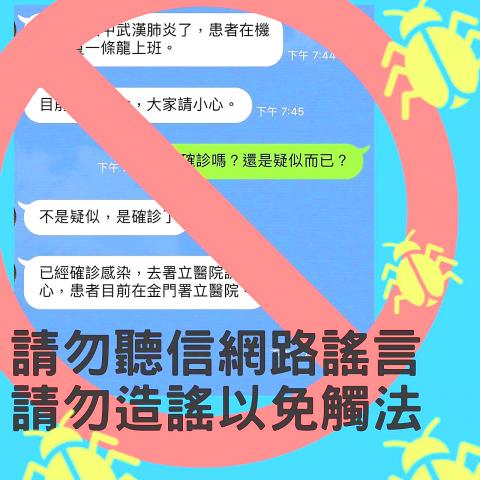A number of people have been summoned for questioning as the judiciary cracks down on online rumors regarding the 2019 novel coronavirus (2019-nCoV) outbreak.
People must fact-check and verify with local health authorities when discussing information on the outbreak, Criminal Investigation Bureau officer Chen Pei-te (陳培德) said yesterday, adding that circulating misinformation is punishable by fines of up to NT$3 million (US$99,174).
A Yunlin County woman surnamed Shih (施) was summoned for questioning for claiming on Facebook that the hospital to which she took her baby for a vaccine had a confirmed 2019-nCoV patient, Chen said.

Photo: CNA
“Shih was asked by a friend, whom she told that the patient with the ‘Wuhan virus’ was at Chiayi Christian Hospital. This was not true, resulting in an investigation by Yunlin prosecutors,” Chen said.
In another case, people disseminated online that Taichung’s China Medical University Hospital had three confirmed 2019-nCoV patients who were under medical quarantine and that hospital staff were hiding the information from the public, bureau officials said.
Two people who shared the stories with their friends on social media were summoned for questioning by Taichung prosecutors yesterday, after the Centers for Disease Control (CDC) verified that there were no such patients at either hospital and deemed them rumors, Chen said.

Screen grab from Facebook
As of press time last night, the CDC and local health authorities nationwide had filed reports with the bureau and other law enforcement agencies regarding 12 cases of misinformation or rumors about the outbreak. Investigators have identified eight people for questioning and investigation by public prosecutors.
These people could have contravened the Communicable Disease Control Act (傳染病防治法), Article 63 of which stipulates that “persons who disseminate rumors or incorrect information concerning epidemic conditions of communicable diseases, resulting in damages to the public or others, shall be fined up to NT$3 million.”
As of press time, there were 10 confirmed 2019-nCoV cases in Taiwan, the CDC said.
Separately yesterday, the Ministry of Justice said in a statement that all prosecutors’ offices and judicial agencies have been ordered to collaborate with local police to conduct checks of stores and warehouses to ensure there is no hoarding of masks or other medical items.
Article 61 of the act stipulates that during epidemic situations, “individuals who hoard resources that the competent authorities have already started to requisite for purposes of price speculation or to force up prices under serious circumstances” could face a jail term of up to seven years and fines of up to NT$5 million, it said.
People who have been infected must follow orders from health authorities to prevent transmission to other people, it added, citing Article 62 of the act, which stipulates that failure “to comply with instructions by the competent authorities and have thus infected others shall be sentenced to imprisonment for up to three years, criminal detention, or a fine up to NT$500,000.”

Tropical Storm Gaemi strengthened into a typhoon at 2pm yesterday, and could make landfall in Yilan County tomorrow, the Central Weather Administration (CWA) said yesterday. The agency was scheduled to issue a sea warning at 11:30pm yesterday, and could issue a land warning later today. Gaemi was moving north-northwest at 4kph, carrying maximum sustained winds near its center of up to 118.8kph and gusts of 154.8kph. The circumference is forecast to reach eastern Taiwan tomorrow morning, with the center making landfall in Yilan County later that night before departing from the north coast, CWA weather forecaster Kuan Shin-ping (官欣平) said yesterday. Uncertainty remains and

SEA WARNING LIKELY: The storm, named Gaemi, could become a moderate typhoon on Wednesday or Thursday, with the Taipei City Government preparing for flooding A tropical depression east of the Philippines developed into a tropical storm named Gaemi at 2pm yesterday, and was moving toward eastern Taiwan, the Central Weather Administration (CWA) said. Gaemi could begin to affect Taiwan proper on Tuesday, lasting until Friday, and could develop into a moderate typhoon on Wednesday or Thursday, it said. A sea warning for Gaemi could be issued as early as Tuesday morning, it added. Gaemi, the third tropical storm in the Pacific Ocean this typhoon season, is projected to begin moving northwest today, and be closest to Taiwan on Wednesday or Thursday, the agency said. Today, there would likely

DISRUPTIONS: The high-speed rail is to operate as normal, while several airlines either canceled flights or announced early departures or late arrivals Schools and offices in 15 cities and counties are to be closed today due to Typhoon Gaemi, local governments announced last night. The 15 are: Taipei, New Taipei City, Taoyuan, Tainan, Keelung, Hsinchu and Kaohsiung, as well as Yilan, Hualien, Hsinchu, Miaoli, Chiayi, Pingtung, Penghu and Lienchiang counties. People should brace for torrential rainfall brought by the storm, with its center forecast to make landfall on the east coast between tonight and tomorrow morning, the Central Weather Administration (CWA) said. The agency issued a sea warning for the typhoon at 11:30pm on Monday, followed by a land warning at 11:30am yesterday. As of

CASUALTY: A 70-year-old woman was killed by a falling tree in Kaohsiung as the premier warned all government agencies to remain on high alert for the next 24 hours Schools and offices nationwide are to be closed for a second day today as Typhoon Gaemi crosses over the nation, bringing torrential rain and whipping winds. Gaemi was forecast to make landfall late last night. From Tuesday night, its outer band brought substantial rainfall and strong winds to the nation. As of 6:15pm last night, the typhoon’s center was 20km southeast of Hualien County, Central Weather Administration (CWA) data showed. It was moving at 19kph and had a radius of 250km. As of 3pm yesterday, one woman had died, while 58 people were injured, the Central Emergency Operation Center said. The 70-year-old